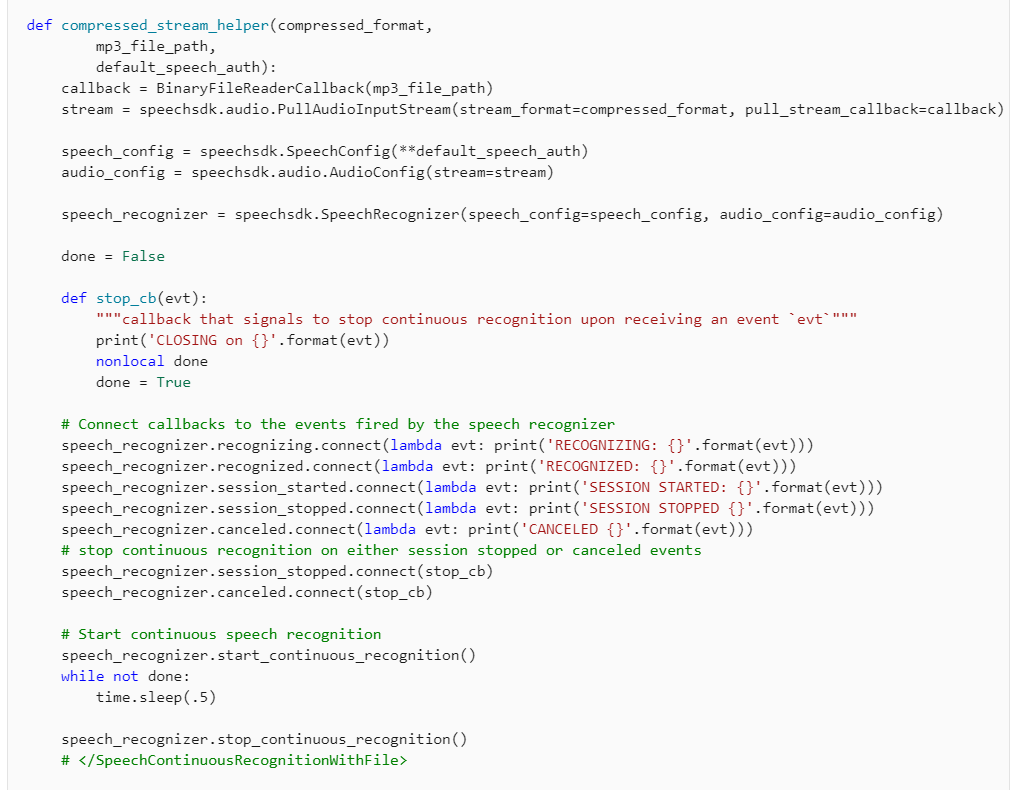I integrated Twilio Media stream with Azure Cognitive service (Speech to Text). I inherited speechsdk.audio.PullAudioInputStreamCallback class to send audio chunks to server. ref : speech_sample.py
import azure.cognitiveservices.speech as speechsdk
import queue
class SocketReaderCallback(speechsdk.audio.PullAudioInputStreamCallback):
def __init__(self):
super().__init__()
self._q = queue.Queue()
def read(self, buffer: memoryview) -> int:
chunk = self._q.get()
buffer[:len(chunk)] = chunk
return len(chunk)
def has_bytes(self):
return True if self._q.qsize() > 0 else False
def queueup(self,chunk):
self._q.put(chunk)
def close(self):
print("AZ.Callback.Closed")
Below is code for transcriber class. Here add_request method adds audio chunks to Queue of above callback class and that method is called from Twilio's socket connection. callback class picks chunks from queue and uploads to Azure server for transcription.
import azure.cognitiveservices.speech as speechsdk
import queue
from rule_engine.medium.azure_transcribe.azure_calback import SocketReaderCallback
class AzureTranscribe:
def __init__(self, speech_config, on_response, user_id):
self._on_response = on_response
self.callback = SocketReaderCallback()
wave_format = speechsdk.audio.AudioStreamFormat(samples_per_second=8000, bits_per_sample=8, channels=1)
self._stream = speechsdk.audio.PullAudioInputStream(self.callback,wave_format)
audio_config = speechsdk.audio.AudioConfig(stream=self._stream)
self._speech_recognizer = speechsdk.SpeechRecognizer(speech_config=speech_config, language="en-IN", audio_config=audio_config)
self._ended = False
self.user_id = user_id
self.initialize_once()
self.state = None
def initialize_once(self):
# Connect callbacks to the events fired by the speech recognizer
self._speech_recognizer.recognizing.connect(lambda evt: print('AZ.RECOGNIZING: {}'.format(evt)))
self._speech_recognizer.recognized.connect(lambda evt: print('AZ.RECOGNIZED: {}'.format(evt)))
self._speech_recognizer.session_started.connect(lambda evt: print('AZ.SESSION STARTED: {}'.format(evt)))
self._speech_recognizer.session_stopped.connect(lambda evt: print('AZ.SESSION STOPPED {}'.format(evt)))
self._speech_recognizer.canceled.connect(lambda evt: print('AZ.CANCELED {}'.format(evt)))
self._speech_recognizer.start_continuous_recognition()
def add_request(self, buffer):
# buffer, self.state = audioop.ratecv(bytes(buffer), 2, 2, 8000, 16000, self.state)
self.callback.queueup(bytes(buffer))
def terminate(self):
self._ended = True
self._speech_recognizer.stop_continuous_recognition()
- If I upload audio chunks from an audio file, the transcription is accurate.
- If I upload audio chunks from twilio call, transcription is very bad.
Twilio's sample rate is 8 kHz while Azure's expected sample rate is 16 kHz. Yet Azure works with both sample rates and provides poor quality transcription for both.
